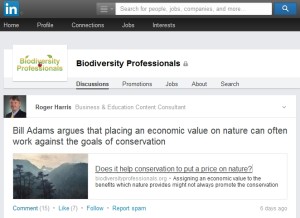 What’s it about in short: article and related LinkedIn discussion on the benefits and risks of economic valuation of nature (with some references to biodiversity offsets)
What’s it about in short: article and related LinkedIn discussion on the benefits and risks of economic valuation of nature (with some references to biodiversity offsets)
When was it released: September 11, 2015
By whom: Roger Harris, Biodiversity Professionals
More info: http://biodiversityprofessionals.org/does-it-help-conservation-to-put-a-price-on-nature/ and https://www.linkedin.com/grp/post/3667510–6048136077074583555
Short extract:
From the article (Roger Harris)
Assigning an economic value to the benefits which nature provides might not always promote the conservation of biodiversity, and in some cases may lead to species loss and conflict, argues a University of Cambridge researcher.
From the LinkedIn comments (Jack Krohn)
“Folks, an interesting discussion, and not one to which I think there’s a simple answer. Biodiversity offsets seem to be applied in a very wide range of ways in different places, with a comparably wide-ranging spectrum of environmental outcomes. At their best, they can bring project proponents face to face with the need to make some form of restitution for environmental damage, as opposed to the older approach where environmental assessment just reached a conclusion about whether the impact (damage) was acceptable (without requiring any form of compensation), so at a simple level that would seem to be a step forward. But there also needs to be some real-world accounting about whether the offset represents genuine compensation for the impact, and still ruling out unacceptable impacts (such as extinctions) for which genuine offsets cannot be applied. In terms of economics (and cheerfully admitting not to be an economist), the most compelling argument I have heard for expressing environmental values in monetary terms is that, whether we like it or not, most of the most influential decisions about the environment are made by politicians and economists. If environmental advocates can’t frame an argument in terms and language which resonate with those decision-makers, we might try to console ourselves with the thought that they were too stupid to understand, but that won’t reverse the decisions they make or the damage that results. Or make any difference to the next decision.”
